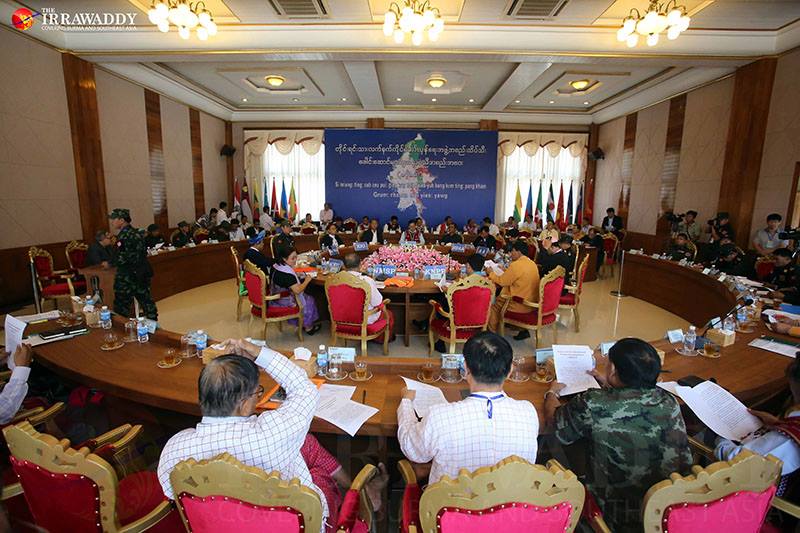Familiar Blocks on the Road to Peace
By Burma Partnership • May 11, 2015 As the ethnic armed groups’ summit in Panghsang, Shan State concluded on 6 May 2015, familiar obstacles still loom large in the peace process. Namely, the 2008 Constitution, continued attacks and human rights violations committed by the Burma Army, and a lack of trust. Various commentators and organizations, including Burma Partnership, sounded words of caution after the over excitement caused by the agreement in principle of the draft nationwide ceasefire agreement (NCA), and those words of caution are salient today as peace remains out of sight.
As the ethnic armed groups’ summit in Panghsang, Shan State concluded on 6 May 2015, familiar obstacles still loom large in the peace process. Namely, the 2008 Constitution, continued attacks and human rights violations committed by the Burma Army, and a lack of trust. Various commentators and organizations, including Burma Partnership, sounded words of caution after the over excitement caused by the agreement in principle of the draft nationwide ceasefire agreement (NCA), and those words of caution are salient today as peace remains out of sight.
The summit in Panghsang, territory controlled by the United Wa State Army (UWSA), brought together 12 major ethnic armed groups for talks that lasted six days. Groups that were present included those bearing the brunt of Burma Army offensives the past few weeks, the Kachin Independence Organization (KIO), the Ta’ang National Liberation Army (TNLA), the Arakan Army (AA), and the Myanmar National Democratic Alliance Army (MNDAA). In fact, as talks were being held, the Burma Army attacked Kachin Independence Army (KIA) positions with airstrikes. It is not just the armed groups themselves who are bearing the brunt of attacks, but horrific human rights violations committed by the Burma Army on fleeing ethnic Kokang villagers, such as extrajudicial killings, including beheadings, are creating deep-seated fear among those who have been displaced by the conflict, but who are being pressured to return by Burma authorities.
The statement from the summit stood in solidarity with the groups that are currently under attack from the Burma Army, dispelling concerns that divide-and-rule tactics, so commonly used over the past decades, are not succeeding. The government is trying to push ahead with the signing of the NCA without all ethnic armed groups signing on, which makes the term ‘nationwide’ ironic to say the least. Thus, it does not recognize the AA and the MNDAA as members of the Nationwide Ceasefire Coordination Team (NCCT) even though they are in fact, members. Tar Bong Kyaw, General-Secretary of the TNLA points out, “It’s very clear they are trying to divide the alliance of ethnic armed groups. This is very dangerous.” One outcome of the summit was that the NCCT “will not leave them (behind).”
The 2008 Constitution, which entrenches power with the Burma Army and denies equality to ethnic nationalities of Burma, once again reared its ugly head. President Thein Sein and his government may well be “ready to finalize” the NCA, and Aung Naing Oo of the government proxy, the Myanmar Peace Center may well believe that “[Burma] made history” when the draft NCA was agreed in principle. However, the NCA has not been signed and the ethnic armed groups are still rejecting the government’s approach. In addition, fundamental points of tension remain unresolved and until the 2008 Constitution is amended and a system of federalism based on democratic principles is guaranteed, peace will remain elusive. As the Ethnic Nationalities Affairs Center states, “This NCA draft signifies that the establishment of a federal union is contingent on the outcome of political dialogue, therefore, it does not guarantee the establishment of a federal union since it is unclear how the political dialogue will proceed.”
There are human rights organizations, journalists, community-based organizations, political analysts and others who do indeed point out the flaws in the peace process. This is not negativity for the sake of it. This is an honest appraisal of a deeply flawed process in which the government and the Burma Army have still not shown the political will to tackle structural and institutional problems which are prolonging this conflict. The government, peace donors and others including the Special Adviser on Burma to the UN Secretary-General, Vijay Nambiar laud praise on this process but this in itself is damaging. It deflects attention from the pervasive aggression that the Burma Army continues to display, and deflects attention from substantive political change that is needed in Burma. As more people are displaced or killed and talks falter it is time that donors, policy-makers and international actors stop being deceived by this farce.
Tags: 2008 Constitution, Arakan Army, Burma Partnership, Ethnic Armed Organisations, Ethnic Nationalities Affairs Center, Kachin Independence Army, Kokang, Myanmar National Democratic Alliance Army, Nationwide Ceasefire Agreement, Nationwide Ceasefire Coordination Team, Refugees, Ta'ang National Liberation ArmyThis post is in: Blog
Related PostsMyanmar: Release Four “Rohingya Calendar” Political Prisoners
Burma: Rights Priorities for New Government
Myanmar: Scrap or Amend new Law that could Grant Immunity to Former Presidents
Burma Army Moves to Tighten Grip on Power
Sounds of War Taint the Cheers of Election Success









 All posts
All posts